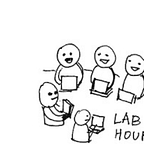Recreating Ken Knowlton & Lillian Schwartz
On Monday, our TA Matt Jacobson taught our Recreating the Past class while Zach Lieberman was out of town. We began with a share of our John Whitney assignments from the previous class. Typically we split up to share in smaller groups, but this week we used Gregory’s approach for wireless screen-sharing so that we could view the work together as a class. It was great to see how each of our peers approached the project. Much of the class was actually spent asking questions about each other’s approaches.
Afterward, we began to study Ken Knowlton and Lillian Schwartz. Ken Knowlton is an artist and computer graphics pioneer who developed the BEFLIX and EXPLOR programming languages at Bell Labs in 1963 and is known for his computational photomosaics. Lillian Schwartz is a pioneering computer-mediated artist who collaborated with Knowlton at Bell Labs on a variety of computer-generated films built with BEFLIX and EXPLOR. During class, we watched Pixillation (1970), one of Schwartz and Knowlton’s earliest collaborative films, which merged flashing colors, photographs, and algorithmically-generated animations together into a beautiful cacophony. The remainder of the class was spent discussing how we could recreate similar visuals using openFrameworks.
Black Gooey Universe
On Tuesday’s Dark Matters class with American Artist, we discussed American’s essay Black Gooey Universe. Black Gooey Universe concisely discusses the ideological foundation associated with the transition from the black terminal interfaces of early computers to the largely white graphical user interfaces (GUI) that have been common since the Apple Lisa. Black Gooey Universe posits that this shift comes from an effort to make whiteness the normative default, and explores what computers that focus on exemplifying blackness might look like. American also showed us the art projects that inspired their interest in this topic (i.e. “A Refusal”, “The Black Critique”) and that explore the concepts in the Black Gooey Universe essay through art (i.e. “Black Gooey Universe”, “Untitled (Portal)”).
Gates & EAGLE
Our Hardware class with Taylor Levy of CW&T began with a review of our homework assignment on logic gates. We were asked to build logic gates on a breadboard and on cardboard. Students shared a host of great assignments, including thoughtful explanations of complex gates, cleanly organized breadboard gates, and even composable gate games. I was personally impressed by how legible circuitry can help to express these obscure topics in a much more approachable way.
Afterward, Taylor walked us through the process of building a simple inverter circuit using EAGLE, a CAD software for circuit design. EAGLE is quite complex, but having it explained thoroughly made it much easier to understand. During the walk-through, Taylor passed around various circuit boards that she had printed for previous project prototypes and showed us the EAGLE files for Time Since Launch. Overall, this section of the class helped me to understand more about how experts manage the complexity of advanced circuitry.
Scrapism
In this week’s Scrapism class with Sam Lavigne, students shared their poems made with Python. The range of projects was wide, but there seemed to be a natural theme around using personally important text (email conversation threads, text messages, etc) to make very personal poems. Later, Sam showed us the basics of web scraping with request_html and showed us how to scrape news sites to help demo the technology.
Strange Foundation Retreat
After class on Thursday, we traveled to our retreat at the Strange Foundation. Taeyoon Choi, Lauren Gardner, and Celine Katzman planned this retreat as an opportunity for students to focus on artist statements and broader artistic goals. After arriving at Strange Foundation, we cooked a dinner of curry, rice, and salad and ate as a group. After dinner, Lauren asked us to split into pairs and ask questions about each other. We shared three facts about each of our partners with the rest of the students. After dessert and cleaning, we went to a smaller cabin and had a genuine discussion about imposter syndrome and the paralyzing pressure of success that we sometimes place on ourselves during the learning process. The conversation was relieving, intimate, and powerful. We left with a much greater interest in collaborative projects and some concrete tactical plans to facilitate them.
The next morning began with a reflective session lead by Taeyoon. We were asked to think about the artists that inspire us and share them with the group. We took a short walk into the forested area near Strange Foundation to reflect on a single sentence to describe what we hope to achieve with our art practice, which we shared with the group as well. Taeyoon closed this session by reading 10 statements from his letter of advice to SFPC students.
In the next session, Celine led us through a group reading of our artist statement drafts. It was motivating to hear the amazing ways that my peers represent their art practice, and Celine and Taeyoon’s answers to the full group questions were very insightful. Celine asked us to split into pairs to give more one-on-one feedback. Even though these small feedback sessions were only scheduled for 30 minutes, the conversations between members of the cohort lasted for hours.
The last session of the retreat was led by Lauren, who talked to us about preparing for the SFPC showcase. Lauren showed us inspiring videos from Fall 2017 showcase. We discussed how to manage stress during the showcase preparation process and naturally transitioned into a more general conversation about how to protect our emotional energy as artists. We ended the night with fun conversation and cleaning before traveling back to NYC the following morning.
